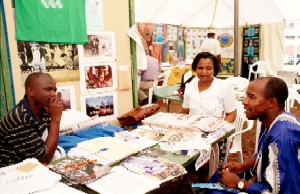By Bruce Best
 The idea was
good. It would be an assembly with padare and, as WCC general secretary Konrad
Raiser put it, that would "serve as an indicator of the growing points,
the problem points, the open questions, the new horizons that people are beginning
to explore".
The idea was
good. It would be an assembly with padare and, as WCC general secretary Konrad
Raiser put it, that would "serve as an indicator of the growing points,
the problem points, the open questions, the new horizons that people are beginning
to explore".
And the experience of padare? Positive things can be said about it. "A good
experiment" is one way staff co-ordinator Myra Blyth sums it up. "The atmosphere
in padare is very open, people are listening to each other, and that’s certainly what
we hoped for. That process of dialogue, learning and respect is evident."
But many other people have visited padare events or exhibitions and come away feeling
disappointed or, sometimes, angry.
"The first action of the incoming central committee should be to offer a public
apology to the padare participants for the way their presentations have been treated. The
padare concept was basically good but eventually got lost in the poor planning of the
event," said the Rev. Ron O’Grady, now retired but an ecumenical staff person
for many years.
In brief, the criticism is that events were hard for people to find, that exhibitors were
placed in booths and tents in out-of-the-way places. The local vendors seem to receive
more attention from assembly participants than the people whose efforts went in to the
padare.
"Those are genuine criticisms and they are valid. Some (sessions and stands) are much
less strategically placed than others. The padare ideally would be much more
concentrated," said Blyth. "We will learn a lot from this. We see lots of ways
to be better next time."
But she is convinced that the evaluation of the padare will find that it’s not only
location that determines attendance.
One of those is the number of offerings for an event the size of this assembly. One
working basis is that only about a third, or maybe a half, of those attending will go to
any padare event. And the padare at this assembly was "designed for a larger number
than were able, or wanted, to take part in it".
Another is about the environment. "We know from this experience that location and
accessibility are very important." But surely any sensible organiser knows that before
the event? Yes, but the arrangements here were "the best options we had for this
particular site and out of the discussion with the university. They wanted us to use their
facilities."
As it stands, both sides of the story seem to have happened — the good and the bad.
Unity sessions have been some of the best attended, and padare workshops on globalisation
and on debt have attracted good crowds. Another session on the viability of the ecumenical
movement was packed out (about 60 people), while an inter-faith padare drew more than 100
people and generated very strong discussion.
Predictably, sexuality events had been very well attended, she said. Less predictably
perhaps, "the atmosphere (was) extremely good. ... There have been extremely well
conducted conversations."
Each of those positives, however, can be matched by at least one story of disappointment
and frustration.
For example, some African women came with a carload of books for their padare stand. They
ended up so far away from the popular pathways of the assembly that no one came by their
stand. And Christine von Weisecker, a world figure in the area of biotechnology, was here
for two padare sessions but "no one knew about it. The whole padare thing is a
mess," said a person involved with that visit.
Nils Carstensen, in Harare for the joint churches agency Action by Churches Together
(ACT), said he felt — and so did a number of small groups with stands near his —
that it was a waste of time being involved in the padare.
"Why bother to come all this way? It’s quite an investment, and my impression is
that the investment is not paying."
He felt "geographically pushed away" by the assembly, he said. Not many people
passed by. The ACT workshop held the previous day had attracted four, and three of those
came only because another event nearby had been cancelled.
As Ron O’Grady put it, "It is particularly unfortunate for some third world
organisations who have spent many thousands of dollars bringing personnel and materials to
Harare, only to find that their presentation has been lost in the confusion and dispersal
of the display locations.
"More padare participants assumed that the WCC would at least take their concerns
seriously because the preliminary publicity claimed that the padare process would feed
into the WCC structures. However, the way the events have been structured, they are
isolated and random presentations."
Blyth said the average number of people at workshops has been about 40-50, but she knows
about small numbers, too. She did one padare (on gender and diakonia) and only four people
came.
"It’s true that some (padare organisers) have been disappointed when three or
four people turned up when they had hoped for 40 or 50 to attend," she said, but
added that "people go to these things because they want to have a discussion".



The idea was good. It would be an assembly with padare and, as WCC general secretary Konrad Raiser put it, that would "serve as an indicator of the growing points, the problem points, the open questions, the new horizons that people are beginning to explore".
